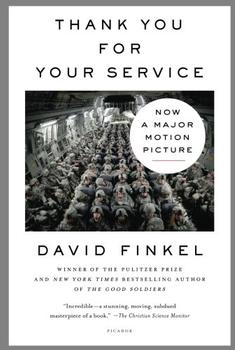Summary | Excerpt | Reviews | Beyond the Book | Read-Alikes | Genres & Themes | Author Bio

Critics' Opinion:
Readers' Opinion:
First Published:
Oct 2013, 272 pages
Paperback:
Sep 2014, 272 pages
 Book Reviewed by:
Book Reviewed by:
Kim Kovacs
Buy This Book
This article relates to Thank You for Your Service
Post-Traumatic Stress Disorder (PTSD) and Traumatic Brain Injury (TBI) are being called the "signature injuries" of the Iraq and Afghanistan Wars. These conditions are closely related, but are, in fact, vastly different.
PTSD is a psychological response to a traumatic event. While most associate the term with military combat, any overwhelming life experience can trigger it, especially if the event feels unpredictable or uncontrollable. It can affect anyone who experiences, witnesses, or cleans up after a catastrophe. Those with PTSD most often see symptoms develop soon after an event, but sometimes it can take weeks, months or years before they occur. People with PTSD find their symptoms do not decrease and may even get worse over time. Symptoms of PTSD include reliving the event, particularly through nightmares or flashbacks; avoiding situations that remind the person of the event; negative changes in beliefs and feelings; and/or feeling keyed up. It may also be accompanied by feelings of hopelessness, shame, or despair; depression or anxiety; drinking or drug problems; physical symptoms or chronic pain; employment problems; or relationship issues, including divorce.
Military personnel with PTSD are less likely to seek treatment than civilians with the ailment partially because military culture frequently stigmatizes those with PTSD, often viewing those with mental health issues as "weak." They are also concerned that if superiors know they have been treated for PTSD it may impact their military career or security clearance. According to the RAND Corporation, an independent, nonprofit research institution, the Department of Defense has implemented more than 100 programs to reduce the stigma associated with mental health issues. RAND estimates that the two-year cost to society related to the treatment and lost productivity of returning service members with PTSD and depression is $6 billion.
Treatment techniques are varied, and it's still not clear which methods are most effective. Psychological counseling, teaching the person coping skills and prescribing medication are the most frequently used therapies. Recovery is possible for those with PTSD, although some may never recover fully.
TBI, on the other hand, is physical damage to the brain. There is still much debate surrounding the mechanics of blast-induced TBI. Some hypothesize that the skull itself is deformed during a blast, causing the injury. Yet others suggest that the compression of blood vessels that occurs as a result of TBI leaves no damage to the skull, but is enough to damage brain tissue. In some cases it can be very difficult to diagnose because the physical damage can't necessarily be seen in scans.
The symptoms of TBI are nearly identical to those of PTSD, and consequently misdiagnosis can occur. Like PTSD, TBI can occur in conditions other than war. It's estimated that 22% of combat casualties from Iraq and Afghanistan have brain injuries, compared with 12% of injuries from the Vietnam War. The TBI numbers in these more recent wars might be higher because of improved body armor; in the past, soldiers would have died of other blast-induced wounds before it became evident they had TBI. While the latest equipment does protect the body much better, it unfortunately does little to protect against TBI.
An individual may or may not be able to recover from TBI, depending on what area of the brain was injured and how severely. Symptoms are treated with pharmaceuticals, and patients are taught skills for coping with memory issues and other mental impairments that result from the injury.
While the information above, based on current thinking, appears to draw a line between PTSD as a psychological condition and TBI as a physical one, the reality is rather more complex. First, both conditions often coexist in the brains of those who have sustained serious traumatic injury. Second, clinical evidence suggests that even mild TBI can lead to increased risk for PTSD. Perhaps most important, our understanding of the human brain is still in its infancy and as scientists learn more about the brain's functioning the line between psychological and physical conditions continue to blur.
Filed under Medicine, Science and Tech
![]() This "beyond the book article" relates to Thank You for Your Service. It originally ran in October 2013 and has been updated for the
September 2014 paperback edition.
Go to magazine.
This "beyond the book article" relates to Thank You for Your Service. It originally ran in October 2013 and has been updated for the
September 2014 paperback edition.
Go to magazine.





The Flower Sisters
by Michelle Collins Anderson
From the new Fannie Flagg of the Ozarks, a richly-woven story of family, forgiveness, and reinvention.

The House on Biscayne Bay
by Chanel Cleeton
As death stalks a gothic mansion in Miami, the lives of two women intertwine as the past and present collide.

The Funeral Cryer by Wenyan Lu
Debut novelist Wenyan Lu brings us this witty yet profound story about one woman's midlife reawakening in contemporary rural China.
Your guide toexceptional books
BookBrowse seeks out and recommends the best in contemporary fiction and nonfiction—books that not only engage and entertain but also deepen our understanding of ourselves and the world around us.